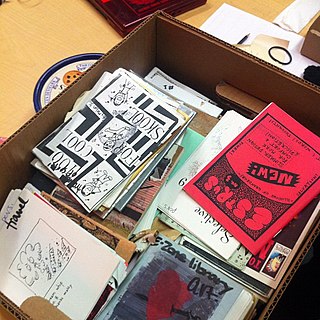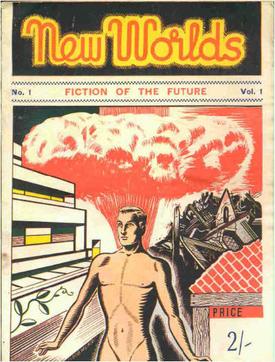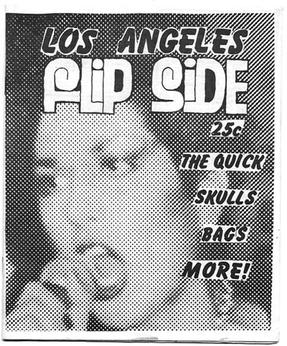
A fanzine is a non-professional and non-official publication produced by enthusiasts of a particular cultural phenomenon for the pleasure of others who share their interest. The term was coined in an October 1940 science fiction fanzine by Russ Chauvenet and first popularized within science fiction fandom, and from there the term was adopted by other communities.
Pulp magazines were inexpensive fiction magazines that were published from 1896 until around 1955. The term "pulp" derives from the wood pulp paper on which the magazines were printed, due to their cheap nature. In contrast, magazines printed on higher-quality paper were called "glossies" or "slicks". The typical pulp magazine had 128 pages; it was 7 inches (18 cm) wide by 10 inches (25 cm) high, and 0.5 inches (1.3 cm) thick, with ragged, untrimmed edges. Pulps were the successors to the penny dreadfuls, dime novels, and short-fiction magazines of the 19th century.

A zine is a small-circulation self-published work of original or appropriated texts and images, usually reproduced via a copy machine. Zines are the product of either a single person or of a very small group, and are popularly photocopied into physical prints for circulation. A fanzine is a non-professional and non-official publication produced by enthusiasts of a particular cultural phenomenon for the pleasure of others who share their interest. The term was coined in an October 1940 science fiction fanzine by Russ Chauvenet and popularized within science fiction fandom, entering the Oxford English Dictionary in 1949.

Doctor Who Magazine is a magazine devoted to the British science fiction television series Doctor Who.

New Worlds was a British science fiction magazine that began in 1936 as a fanzine called Novae Terrae. John Carnell, who became Novae Terrae's editor in 1939, renamed it New Worlds that year. He was instrumental in turning it into a professional publication in 1946 and was the first editor of the new incarnation. It became the leading UK science fiction magazine; the period to 1960 has been described by science fiction historian Mike Ashley as the magazine's "Golden Age".

SFX is a British magazine covering the topics of science fiction and fantasy. Its name is a reference to the abbreviated form of "special effects".

Famous Monsters of Filmland is an American genre-specific film magazine, started in 1958 by publisher James Warren and editor Forrest J Ackerman.

Flipside, known as Los Angeles Flipside Fanzine, was a punk zine published in Whittier and Pasadena, California, from 1977 to 2002. The magazine was associated with its own record label, Flipside Records, releasing vinyl records and compact discs beginning in 1978.

Trouser Press was a rock and roll magazine started in New York in 1974 as a mimeographed fanzine by editor/publisher Ira Robbins, fellow fan of the Who, Dave Schulps, and Karen Rose under the name "Trans-Oceanic Trouser Press". Publication of the magazine ceased in 1984. The unexpired portion of mail subscriptions was completed by Rolling Stone sister publication Record, which itself folded in 1985. Trouser Press has continued to exist in various formats.

Fans of the long-running British science fiction television series Doctor Who are referred to as Whovians, or collectively as the Doctor Who fandom.

Craig Peter Hinton was a British writer best known for his work on various spin-offs from the BBC Television series Doctor Who. He also wrote articles for various science fiction magazines, and was the Coordinator of the Doctor Who Appreciation Society. He most recently lived in London, where he taught mathematics. Hinton was found dead in his home on 3 December 2006. The cause of death was given as heart attack.
John Freeman is a British writer/editor/designer known for his work with Marvel UK, and on Doctor Who Magazine and The Really Heavy Greatcoat.

ZigZag was a British rock music magazine. It was started by Pete Frame and the first edition was published on 16 April 1969. The magazine was noted for its interviews, articles, innovative "rock family trees" by Frame, and support for American songwriters such as Michael Nesmith, Mickey Newbury, Gene Clark, etc. It lasted in various forms through 1986.
The Doctor Who Appreciation Society (DWAS) is a society for fans of the television series Doctor Who. It was founded in May 1976, emerging from the Westfield College Doctor Who Appreciation Society, and the editors and readers of the fanzine Tardis.
David Bailey is a British editor and author whose published output to date comprises a combination of short stories, audio dramas and magazine articles.
Ian Marsh is a British writer, magazine editor, and entrepreneur.
William Levi Crawford was an American publisher and editor.
New Media Distribution/Irjax Enterprises was a comic book distributor and publisher active from the mid-1970s to the mid-1980s. In 1978, the company's legal actions against the dominant distributor of the era, Sea Gate Distributors, widened the field for the direct market to expand. In 1982, when Irjax's distribution arm went out of business, its processing centers and warehouses formed the basis for Diamond Comics Distributors, the now-dominant comics distributor.

David J. Howe is a British writer, journalist, publisher, and media historian.












